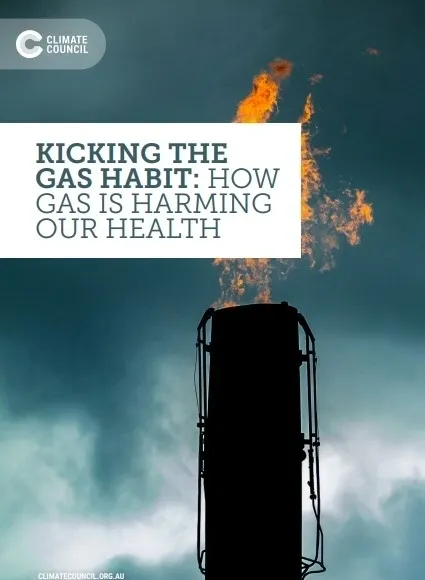
A new report by the Climate Council has called out gas as a polluting fossil fuel that is harming our health, wellbeing and the climate.
Gas has been marketed to Australians as a safe, clean alternative to other fossil fuels but the Climate Council report has recommended it’s important for Australia to ‘get off gas’.
The report, called Kicking the Gas Habit: How Gas is Harming Our Health found that gas extraction and consumption directly impact the health of Australians today.
“Relying on gas for our energy needs poses multiple threats to human health, through exposure to known environmental contaminants,” the report said adding those health risks were associated with both the production and consumption of gas in Australia.
PRODUCTION
The first part of the report looked at gas production and the most insidious of its revelations related to water contamination.
“Many of the health concerns with the production phase of unconventional gas relate to the contamination or depletion of water resources,” it said.
“Chemicals present in wastewater – both naturally occurring and introduced – include substances known to harm reproductive capabilities and/or interfere with fetal, infant and child development, carcinogens as well as agents that interfere with the body’s hormone systems and so may interfere with growth and development.”
According to the Climate Council, regulation of the storage and use of such wastewater leaves a great deal to be desired: “The wastewater may be injected back into the ground or held in unlined pits, with the risk of it contaminating productive groundwater resources. It may also be evaporated from large holding ponds and in certain instances used for irrigation of agricultural lands or discharged into rivers.”
“The basic requirements of good health include enough clean air, food and water,” the report said. “For communities living close to gas wells, these essentials may be compromised as they are exposed to contaminated air, surface water and groundwater, chemical additives used during drilling and hydraulic fracturing, and compounds used in or generated through the extraction process.”
Gas causes climate harm even before it is burned, according to the Climate Council report.
“The main component of gas, methane, is a greenhouse gas nearly 100 times more potent than carbon dioxide in the short term. Along the entire gas supply chain large quantities of methane are emitted.”
The rapid growth of Australia’s export gas industry is the main reason that Australia’s total greenhouse gas emissions have remained stubbornly high over the past several years according to the Climate Council.
“Right now, Australia is not counting the true contribution of gas towards climate change. Once this is corrected for, the supposed climate benefit of gas often disappears,” it said.
The wastewater produced in conventional and unconventional gas extraction often contains naturally occurring chemicals that are harmful to human health. While naturally occurring underground, these chemicals can be hazardous when brought to the surface, according to the report.
Unconventional gas extraction was represented as the most harmful in the report. Three main types of unconventional gas are either under production in Australia today, or under active consideration: coal seam gas, shale gas, and tight gas. The report defined each and explained the involvement of de-watering and fracking in each.
It argued: “Unconventional gas extraction amplifies the health risks associated with conventional gas and introduces a number of additional ones.
“Unconventional reserves are typically spread over a large area, requiring many wells to be drilled. Where water is scarce, as in many regions of Australia where unconventional gas development is underway or proposed, both de-watering and hydraulic fracking may reduce the volume of water available for local farmers and communities. As a result, the extraction of gas exacerbates the water shortages associated with drought.”
The report explained that fracking involved the pumping of significant amounts of chemical-laden water into rock to extract the gas. The precise nature of the chemicals used isn’t even disclosed to the landowner.
“Contamination of land and water – whether as a result of an accident or negligence – is almost inevitable given the scale of extraction activity in Australia.
“Incidents have already occurred, including an instance where a groundwater aquifer was contaminated in New South Wales Pilliga region by coal seam gas operations in the area.
“This led to higher than normal levels of uranium and heavy metals in the groundwater.
“Alongside more serious risks such as permanent groundwater contamination, there are also insidious and chronic risks to communities living near unconventional gas operations.
“Cumulatively, these insidious risks can have a larger impact than a single point-source incident because that they are diffuse throughout the community.”
CONSUMPTION
The report also concluded that household gas use is a major source of indoor air pollution.
“Using gas at home can create a comparable risk of childhood asthma as from household smoking,” it found. “Epidemiological studies looking at populations more broadly than the individual have found clear associations between the use of gas cooktops in the family home and the proportion of children with asthma.
“Gas cooktops are known to produce contaminants that are known to increase the risk of childhood asthma: in particular, nitrogen dioxide and certain forms of particulate matter, such as PM2.5,” the report found.
INEQUITY
Finally, the Climate Council concluded that the negative health impacts of gas production and consumption are not spread evenly and are “borne disproportionately by poorer households, young people and First Nations groups.
“Gas production and use has a greater impact on children and babies; low-income households may not be able to afford gas alternatives; and renters often have little choice over what sort of appliances are in their homes,” the report said.
The Climate Council report explains how the use of gas in electricity generation drives up power prices across the system and contributes to entrenched poverty.
“In some instances prices have tripled,” it said.
Burning gas in power stations is often the most expensive form of electricity generation in use in Australia’s large grids. When the price of gas increases, this drives up the price of gas-powered generation, and so drives up the price of electricity right across the grid even in instances where gas is not technically setting the wholesale price of power.
“For those vulnerable Australians struggling to pay their energy bills, the role of gas in driving up the price of energy has very real public health consequences by further entrenching poverty.”
CONCLUSIONS
“Given current proposals to massively expand the gas industry in Australia, it is vital that Australians understand the health consequences of these plans, as well as the healthier alternatives available,” the Climate Council concluded.
“We do not need new gas when renewables are cheaper and cleaner. Seismic shifts in the economics of renewables over the past decade mean new gas infrastructure is not needed,” the report said.
“The Australian Energy Market Operator sees a steadily shrinking role for gas over the next 20 years (Australian Energy Market Operator, 2020). Wind and solar powered generation, even after being backed by storage, are the cheapest forms of new electricity generating infrastructure.”
The primary vehicle for researching the health impact of the gas industry is funded and overseen by the gas industry itself: the Gas Industry Social and Environment Research Alliance.
“This is a particularly inappropriate vehicle to deliver impartial and robust research into the impact of the country’s growing gas industry,” the Climate Council said.
“Given the negative health impacts identified elsewhere in the peer-reviewed literature, small scale, studies performed under the auspices of the industry – and not subjected to full academic peer-review – like those released by GISERA in the past several years are not sufficient to assess the industry’s safety.
According to the Climate Council there is an “urgent imperative for fully independent research into the impact of the industry, free from the influence of the gas industry. To date, funding for this research – and site access to extraction infrastructure in order to conduct it – has been limited.”


